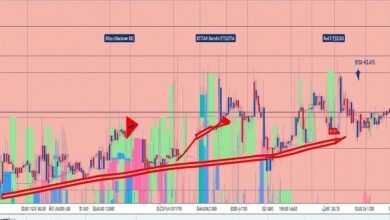op Index Funds to Invest In: A Comprehensive Guide

Introduction
Index funds to invest in are a type of mutual fund or exchange-traded fund (ETF) designed to follow a specific benchmark index, such as the S&P 500. These funds aim to replicate the performance of their benchmark by holding a portfolio that mirrors the index’s components. This strategy provides investors with broad market exposure, low operating expenses, and low portfolio turnover.
Why Choose Index Funds?
One of the primary reasons to consider index funds to invest in is their cost efficiency. Index funds typically have lower expense ratios compared to actively managed funds because they require less hands-on management. Additionally, index funds offer diversification across a wide range of assets, which can reduce risk and improve long-term returns.
How Index Funds Work
Understanding how index funds work is crucial when deciding on the best index funds to invest in. These funds track the performance of a specific index by purchasing the same stocks or bonds that comprise the index. When the index gains or loses value, the fund’s value will typically reflect these changes, providing investors with returns that closely match the index.
Benefits of Investing in Index Funds
The benefits of investing in index funds to invest in are numerous. These funds offer broad market exposure, which can help spread risk across different sectors and industries. They are also tax-efficient, as their low turnover rate minimizes capital gains taxes. Additionally, index funds often outperform actively managed funds over the long term due to their lower costs and consistent strategy.
Top S&P 500 Index Funds
When considering index funds to invest in, the S&P 500 index funds are among the most popular choices. These funds track the performance of the S&P 500, a benchmark index representing 500 of the largest publicly traded companies in the United States. Some of the top S&P 500 index funds include the Vanguard 500 Index Fund (VFIAX), the Fidelity 500 Index Fund (FXAIX), and the Schwab S&P 500 Index Fund (SWPPX).
Best International Index Funds
Diversifying your portfolio with international index funds to invest in can provide exposure to global markets and reduce dependence on the U.S. economy. Some top international index funds include the Vanguard FTSE All-World ex-US Index Fund (VFWAX), the iShares MSCI EAFE Index Fund (EFA), and the Fidelity International Index Fund (FSPSX). These funds offer broad exposure to developed and emerging markets outside of the United States.
Sector-Specific Index Funds
For investors looking to target specific industries, sector-specific index funds to invest in can be a great option. These funds focus on particular sectors such as technology, healthcare, or real estate. Examples of popular sector-specific index funds include the Technology Select Sector SPDR Fund (XLK), the Health Care Select Sector SPDR Fund (XLV), and the Vanguard Real Estate Index Fund (VGSLX).
Bond Index Funds
While many investors focus on stock index funds, bond index funds to invest in are also essential for a well-rounded portfolio. These funds track the performance of a specific bond index, providing income and diversification. Some top bond index funds include the Vanguard Total Bond Market Index Fund (VBTLX), the iShares Core U.S. Aggregate Bond ETF (AGG), and the Fidelity U.S. Bond Index Fund (FXNAX).
How to Choose the Right Index Fund
Selecting the right index funds to invest in involves considering several factors. These include the fund’s expense ratio, tracking error, tax efficiency, and the specific index it follows. It’s also important to assess your own investment goals, risk tolerance, and time horizon. By carefully evaluating these factors, you can choose index funds that align with your financial objectives.
Tips for Investing in Index Funds
When investing in index funds to invest in, there are a few key tips to keep in mind. First, focus on long-term investing to take advantage of compounding returns. Second, diversify your investments across different asset classes and sectors. Third, pay attention to the expense ratios, as lower costs can significantly impact your overall returns. Lastly, stay disciplined and avoid making emotional investment decisions based on short-term market fluctuations.
Conclusion
Index funds to invest in offer a simple, cost-effective way to build a diversified investment portfolio. Whether you’re a novice investor looking for a low-risk entry point or an experienced investor seeking to optimize your returns, index funds can be a valuable addition to your financial strategy. By understanding the various options available and carefully selecting the funds that align with your goals, you can enjoy the benefits of broad market exposure and long-term growth potential.
FAQs
1.What are the best index funds to invest in for beginners?
Some of the best index funds to invest in for beginners include the Vanguard Total Stock Market Index Fund (VTSAX), the Fidelity 500 Index Fund (FXAIX), and the Schwab Total Stock Market Index Fund (SWTSX). These funds offer broad market exposure and low costs, making them ideal for new investors.
2.How much should I invest in index funds?
The amount you should invest in index funds to invest in depends on your financial goals, risk tolerance, and investment horizon. It’s generally recommended to allocate a significant portion of your portfolio to index funds due to their diversification and low costs.
3.Are index funds better than individual stocks?
Index funds to invest in are often considered better than individual stocks for many investors because they provide broad market exposure and reduce the risk associated with holding a single stock. Additionally, index funds typically have lower costs and require less research and management.
4.Can I lose money with index funds?
While index funds to invest in are generally considered less risky than individual stocks, they are not risk-free. Market fluctuations can cause the value of index funds to decline, resulting in potential losses. However, over the long term, index funds have historically provided positive returns.
5.What are the tax implications of investing in index funds?
Index funds to invest in are typically more tax-efficient than actively managed funds due to their lower turnover rates. However, investors may still incur capital gains taxes when selling shares. It’s important to consider tax implications and consult with a financial advisor to optimize your investment strategy.




